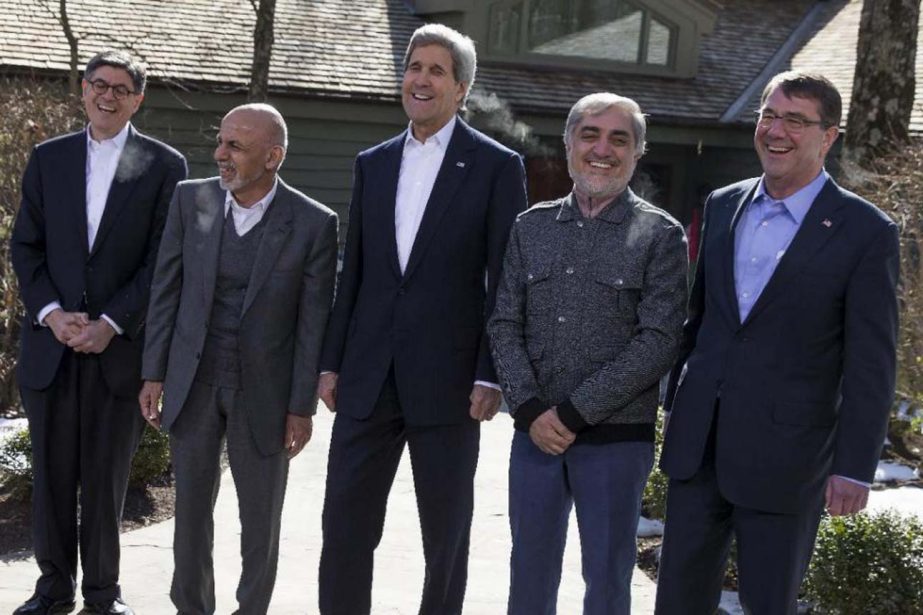
Agencies, Washington :
Afghan President Ashraf Ghani said on Monday that the people in his country did not want US troops to leave.
In an interview to the US National Public Radio, President Ghani said the perception that Afghans were eager for US troops to leave the country “is simply untrue.” Most people in Afghanistan “want continued US troop presence,” he added. “They see the United States as critical to their future.”
President Ghani, who began his first official visit to the United States on Sunday, is leading a high-level delegation, which includes the country’s new chief executive, Abdullah Abdullah.
Earlier on Monday, President Ghani arrived at the US presidential resort at Camp David, Maryland, for meetings with US officials, including secretaries of state, defence and treasury.
In a joint news briefing with US Secretary of State John Kerry, President Ghani hoped that the talks would enable the two allies to implement their bilateral security agreement. Secretary Kerry said the two teams were ready to “spend a quiet, thoughtful day to (talk) about the remarkable transition that is taking place in Afghanistan”.
The main item on their agenda was President Ghani’s request for extending the stay of US troops in Afghanistan.
Ghani has already held several discussions with President Obama on this issue and diplomatic observers in Washington say that the US leader has agreed in principle to continue to keep American troops in Afghanistan. President Obama is expected to make a formal announcement on Tuesday after a meeting with Mr Ghani at the White House.
“This is a remarkable opportunity for us to discuss issues in depth … and to put the strategic partnership agreement and the bilateral security agreement into an operational mode,” Ghani told the news briefing at Camp David.
Secretary Kerry said the two teams were meeting “in an atmosphere of open discussion” and had “a lot of work to do”.
Commenting on the visit, the US media noted that President Obama now had “a real ally” in Afghanistan as compared to the former Afghan leader, Hamid Karzai, with whom he had serious differences.
Karzai had refused to sign a defence pact with the United States and wanted US troops to leave the country as soon as possible. But President Ghani thanked the American nation for the help “so generously provided over the years” and said the best way for “reciprocating the gift means owning our problems, solving them, and asking of ourselves what we must do for ourselves and for the region”.
Ghani told National Public Radio the self-styled Islamic State had a presence in South Asia and was “morphing into a system. … It’s becoming sophisticated. And more than anything else, it’s controlling immense resources”.
Afghan President Ashraf Ghani said on Monday that the people in his country did not want US troops to leave.
In an interview to the US National Public Radio, President Ghani said the perception that Afghans were eager for US troops to leave the country “is simply untrue.” Most people in Afghanistan “want continued US troop presence,” he added. “They see the United States as critical to their future.”
President Ghani, who began his first official visit to the United States on Sunday, is leading a high-level delegation, which includes the country’s new chief executive, Abdullah Abdullah.
Earlier on Monday, President Ghani arrived at the US presidential resort at Camp David, Maryland, for meetings with US officials, including secretaries of state, defence and treasury.
In a joint news briefing with US Secretary of State John Kerry, President Ghani hoped that the talks would enable the two allies to implement their bilateral security agreement. Secretary Kerry said the two teams were ready to “spend a quiet, thoughtful day to (talk) about the remarkable transition that is taking place in Afghanistan”.
The main item on their agenda was President Ghani’s request for extending the stay of US troops in Afghanistan.
Ghani has already held several discussions with President Obama on this issue and diplomatic observers in Washington say that the US leader has agreed in principle to continue to keep American troops in Afghanistan. President Obama is expected to make a formal announcement on Tuesday after a meeting with Mr Ghani at the White House.
“This is a remarkable opportunity for us to discuss issues in depth … and to put the strategic partnership agreement and the bilateral security agreement into an operational mode,” Ghani told the news briefing at Camp David.
Secretary Kerry said the two teams were meeting “in an atmosphere of open discussion” and had “a lot of work to do”.
Commenting on the visit, the US media noted that President Obama now had “a real ally” in Afghanistan as compared to the former Afghan leader, Hamid Karzai, with whom he had serious differences.
Karzai had refused to sign a defence pact with the United States and wanted US troops to leave the country as soon as possible. But President Ghani thanked the American nation for the help “so generously provided over the years” and said the best way for “reciprocating the gift means owning our problems, solving them, and asking of ourselves what we must do for ourselves and for the region”.
Ghani told National Public Radio the self-styled Islamic State had a presence in South Asia and was “morphing into a system. … It’s becoming sophisticated. And more than anything else, it’s controlling immense resources”.

